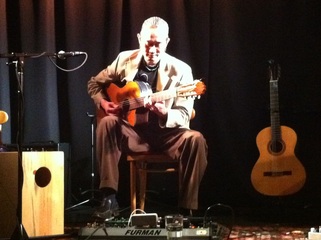
Toshi Onizuka
On July 16, 2011 the Artichoke Cafe (3130 SE Hawthorne Blvd., Portland, OR. http://artichokemusic.org) hosted a benefit
concert for the people of Japan and featured the phenomenal guitarists Goh Kurosawa and Toshi Onizuka. Money was raised for relief efforts for those areas which had suffered from the earthquakes and tsunami of March 11, 2011.
Saturday, March 10, 2012 (March 11, Japan time) saw a return of the same artists to the Artichoke in remembrance of those who had suffered and who continue to suffer from the horrifying effects of the
devastation.
Much of the music featured was written as a result of the heartache and helplessness that musicians and entertainers of Japan felt with their seeming inability to offer any real aid to the victims. The music is uplifting and hopeful and very much in keeping with Japan's tradition of songs of encouragement and strength in the face of tragedy. In a land victimized by disasters both natural and human-made, the music of the Japanese people has continually resounded with optimism and courage. Saturday night proved that point with exclamation.
The first set opened with Portland's adopted son Toshi Onizuka performing his original composition entitled A Song for Fighters. "Life is tough," Toshi explained, "and things are still bad in Japan but we keep looking up." The piece was lyrical and lovely and optimism filled the spaces between the notes, it seemed.
A Love Letter was also an Onizuka composition and revealed his nation's heart played out on Spanish guitar. It was filled with the same beautiful changes that life offers. Those chord changes were not predictable but they were emotional and were punctuated early on with quick, percussive pops like the quick beat of love's heart. It is what the Japanese call doki-doki, the pitter-patter of an excited heart.
His composition Light in Shade may be the most emotional piece of music I have ever experienced. The chords he employed
were not power chords but they were powerful chords. There was an unspeakable beauty in this solo piece. I have never felt so inspired and at peace. The work is reflective and evocative at the same time. It is the song that remains in my head even now.
Much of the music featured was written as a result of the heartache and helplessness that musicians and entertainers of Japan felt with their seeming inability to offer any real aid to the victims. The music is uplifting and hopeful and very much in keeping with Japan's tradition of songs of encouragement and strength in the face of tragedy. In a land victimized by disasters both natural and human-made, the music of the Japanese people has continually resounded with optimism and courage. Saturday
night proved that point with exclamation.
The first set opened with Portland's adopted son Toshi Onizuka performing his original composition entitled A Song for Fighters. "Life is tough," Toshi explained, "and things are still bad in Japan but we keep looking up." The piece was lyrical and lovely and optimism filled the spaces between the notes, it seemed.
A Love Letter was also an Onizuka composition and revealed his nation's heart played out on Spanish guitar. It was filled with the same beautiful changes that life offers. Those chord changes were not predictable but they were emotional and were punctuated early on with quick, percussive pops like the quick beat of love's heart. It is what the Japanese call doki-doki, the pitter-patter of an excited heart.
His composition Light in Shade may be the most emotional piece of music I have ever experienced. The chords he employed
were not power chords but they were powerful chords. There was an unspeakable beauty in this solo piece. I have never felt so inspired and at peace. The work is reflective and evocative at the same time. It is the song that remains in my head even now.
concert for the people of Japan and featured the phenomenal guitarists Goh Kurosawa and Toshi Onizuka. Money was raised for relief efforts for those areas which had suffered from the earthquakes and tsunami of March 11, 2011.
Saturday, March 10, 2012 (March 11, Japan time) saw a return of the same artists to the Artichoke in remembrance of those who had suffered and who continue to suffer from the horrifying effects of the
devastation.
Much of the music featured was written as a result of the heartache and helplessness that musicians and entertainers of Japan felt with their seeming inability to offer any real aid to the victims. The music is uplifting and hopeful and very much in keeping with Japan's tradition of songs of encouragement and strength in the face of tragedy. In a land victimized by disasters both natural and human-made, the music of the Japanese people has continually resounded with optimism and courage. Saturday night proved that point with exclamation.
The first set opened with Portland's adopted son Toshi Onizuka performing his original composition entitled A Song for Fighters. "Life is tough," Toshi explained, "and things are still bad in Japan but we keep looking up." The piece was lyrical and lovely and optimism filled the spaces between the notes, it seemed.
A Love Letter was also an Onizuka composition and revealed his nation's heart played out on Spanish guitar. It was filled with the same beautiful changes that life offers. Those chord changes were not predictable but they were emotional and were punctuated early on with quick, percussive pops like the quick beat of love's heart. It is what the Japanese call doki-doki, the pitter-patter of an excited heart.
His composition Light in Shade may be the most emotional piece of music I have ever experienced. The chords he employed
were not power chords but they were powerful chords. There was an unspeakable beauty in this solo piece. I have never felt so inspired and at peace. The work is reflective and evocative at the same time. It is the song that remains in my head even now.
Much of the music featured was written as a result of the heartache and helplessness that musicians and entertainers of Japan felt with their seeming inability to offer any real aid to the victims. The music is uplifting and hopeful and very much in keeping with Japan's tradition of songs of encouragement and strength in the face of tragedy. In a land victimized by disasters both natural and human-made, the music of the Japanese people has continually resounded with optimism and courage. Saturday
night proved that point with exclamation.
The first set opened with Portland's adopted son Toshi Onizuka performing his original composition entitled A Song for Fighters. "Life is tough," Toshi explained, "and things are still bad in Japan but we keep looking up." The piece was lyrical and lovely and optimism filled the spaces between the notes, it seemed.
A Love Letter was also an Onizuka composition and revealed his nation's heart played out on Spanish guitar. It was filled with the same beautiful changes that life offers. Those chord changes were not predictable but they were emotional and were punctuated early on with quick, percussive pops like the quick beat of love's heart. It is what the Japanese call doki-doki, the pitter-patter of an excited heart.
His composition Light in Shade may be the most emotional piece of music I have ever experienced. The chords he employed
were not power chords but they were powerful chords. There was an unspeakable beauty in this solo piece. I have never felt so inspired and at peace. The work is reflective and evocative at the same time. It is the song that remains in my head even now.
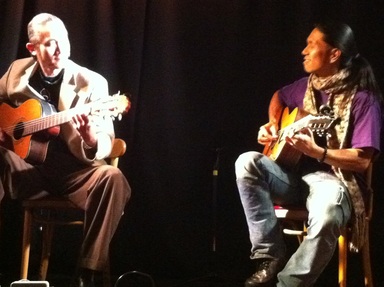
Toshi Onizuka and Goh Kurosawa
Goh Kurosawa replaced Toshi onstage. Before beginning, he paused for several breaths, almost meditatively. The effect on the music was instantly obvious as the piece itself became a meditation.
He employed astonishing Moorish tones and was very interactive with the whole of the guitar. Sometimes seeming dissatisfied with his effort, Goh would transform
the moment into triumph. Moving from sensitive touch to aggressive strike, his smile would give enigmatic indication of what was coming next and the entire piece took on the feel of a suite.
He passed from ritual to reason in the second passage as the tone became an intellectual feast, featuring Japanese modes played out on Spanish guitar. Then a slide back to an almost Villa-Lobos touch with a sensitivity that gave the final passage a characteristic only to be described as the final move from ritual to reason to repose as the piece became a sweet lullaby and ended in peace. It was a guitar exposition on Enlightenment.
As Goh began the opening chords of the next piece, he began to speak of the devastation in Japan. He raised the question asked by so many Japanese performers as to what could a musician do in response to catastrophe. Having just returned from Japan and having seen emptiness now where neighborhoods and towns once stood, he spoke of his conclusion that the only proper answer was "There is nothing to do but not waste my life."
Then the song became Leonard Cohen's Hallelujah... and it was fitting.
It’s not a cry you can hear at night
It’s not somebody who has seen the light
It’s a cold and it’s a broken Hallelujah
But even a cold and broken Hallelujah is still an utterance of gratitude and hoping for hope.
He employed astonishing Moorish tones and was very interactive with the whole of the guitar. Sometimes seeming dissatisfied with his effort, Goh would transform
the moment into triumph. Moving from sensitive touch to aggressive strike, his smile would give enigmatic indication of what was coming next and the entire piece took on the feel of a suite.
He passed from ritual to reason in the second passage as the tone became an intellectual feast, featuring Japanese modes played out on Spanish guitar. Then a slide back to an almost Villa-Lobos touch with a sensitivity that gave the final passage a characteristic only to be described as the final move from ritual to reason to repose as the piece became a sweet lullaby and ended in peace. It was a guitar exposition on Enlightenment.
As Goh began the opening chords of the next piece, he began to speak of the devastation in Japan. He raised the question asked by so many Japanese performers as to what could a musician do in response to catastrophe. Having just returned from Japan and having seen emptiness now where neighborhoods and towns once stood, he spoke of his conclusion that the only proper answer was "There is nothing to do but not waste my life."
Then the song became Leonard Cohen's Hallelujah... and it was fitting.
It’s not a cry you can hear at night
It’s not somebody who has seen the light
It’s a cold and it’s a broken Hallelujah
But even a cold and broken Hallelujah is still an utterance of gratitude and hoping for hope.
The second set saw Toshi and Goh together onstage as Toshi became the percussion in the first piece with hand-claps and a ride on the percussion box.
Meanwhile, Goh playedall the tricks with slapping the soundboard, scratching the strings, rubbing the body and looping the whole excursion as he took up the melody. Fun stuff.
Toshi Onizuka plays with heart and with precision. Goh Kurosawa plays with intelligence and power. Together they are completely complimentary of each other and they make room for each other. They listen to each other.
Below is a Youtube link to Goh's trio performing Goh's own composition Believe.
Meanwhile, Goh playedall the tricks with slapping the soundboard, scratching the strings, rubbing the body and looping the whole excursion as he took up the melody. Fun stuff.
Toshi Onizuka plays with heart and with precision. Goh Kurosawa plays with intelligence and power. Together they are completely complimentary of each other and they make room for each other. They listen to each other.
Below is a Youtube link to Goh's trio performing Goh's own composition Believe.
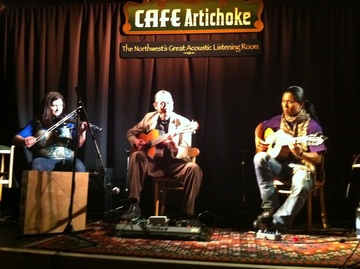
Geli Wuerzner, Toshi Onizuka and Goh Kurosawa
Believe was Goh's work composed after the 3/11 disaster. It is the admonition to be positive and for even those not residing in the troubled areas to maintain "a happy energy for Japan."
Goh and Toshi were joined by Geli Wuerzner a violinist from Lynnwood, Washington. Geli brought a moving addition to the guitars with her 5 string violin. She had said that Japan "does not need your sympathy. They need your joy." And she brought the joy with her.
The opening tones were gorgeous and they carried throughout this sweet melody of hope. Disaster happens
quickly and recovery is slow but joy is all-sustaining.
Goh carried the melody as Toshi scratched the strings like a guiro. Geli popped the strings pizzicato while Goh rubbed the body of his guitar in time with Toshi slapping the soundboard on his. All three returned to playing the strings as they finished the joyful melody.
The audience would not let them depart and were rewarded with Blue Bossa as an encore.
The night was one of tenderness and optimism and the Artichoke Cafe was the perfect place for it. Japan still struggles but the hope found in their music and in the heart of their musicians will see them through this dark night as it has so many times before.
Goh and Toshi were joined by Geli Wuerzner a violinist from Lynnwood, Washington. Geli brought a moving addition to the guitars with her 5 string violin. She had said that Japan "does not need your sympathy. They need your joy." And she brought the joy with her.
The opening tones were gorgeous and they carried throughout this sweet melody of hope. Disaster happens
quickly and recovery is slow but joy is all-sustaining.
Goh carried the melody as Toshi scratched the strings like a guiro. Geli popped the strings pizzicato while Goh rubbed the body of his guitar in time with Toshi slapping the soundboard on his. All three returned to playing the strings as they finished the joyful melody.
The audience would not let them depart and were rewarded with Blue Bossa as an encore.
The night was one of tenderness and optimism and the Artichoke Cafe was the perfect place for it. Japan still struggles but the hope found in their music and in the heart of their musicians will see them through this dark night as it has so many times before.
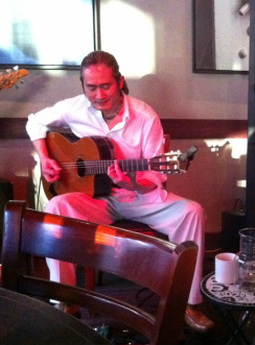
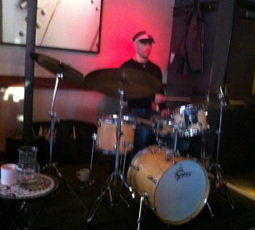
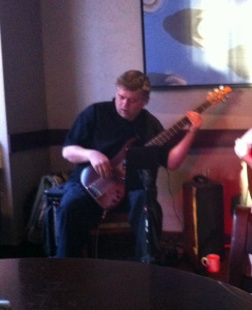
 RSS Feed
RSS Feed
